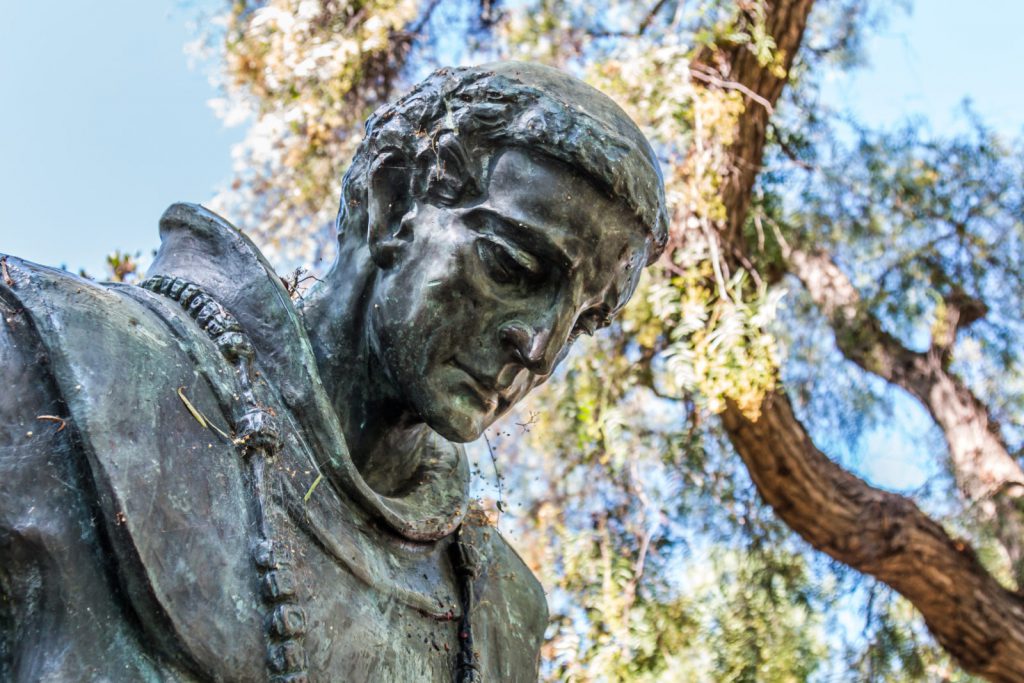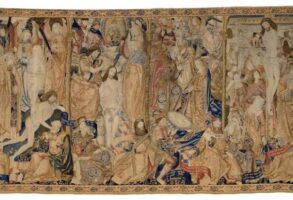
Published September 15, 2017
More than 250 years ago in the untamed Pacific Coast of North America, a Franciscan Friar diligently set about establishing missions in the land that would later become California.
The names of those missions will ring a bell for anyone who knows anything about California: San Diego de Alcalá, San Francisco de Asis, San Juan Capistrano, Santa Clara de Asis, and so on. It’s not for nothing that the friar, Fr. Junipero Serra is called the “Father of California.”
Pope Francis on his 2015 visit to the United States officially declared Serra, who died in 1784, a saint. California has two statues in Statuary Hall of the U.S. Capitol representing the state, and one of them is Serra in bronze.
Earlier this week, a different bronze statue of St. Junipero was beheaded and splattered with blood-red paint outside the Santa Barbara Mission in (you guessed it!) Santa Barbara, Calif. This was just the latest in a string of incidents of vandalism and desecration aimed at the saint and his legacy. In August, a statue of Serra in Mission Hills was splashed with red paint and the word “Murder” written down the saint’s cassock in white letters. Other sites have been vandalized, statues toppled. There was even a failed push to have his statue removed from the U.S. Capitol a few years ago.
Activists see the Franciscan friar as an emblem of Spanish colonialism and thus a potent symbol of the sins of imperialism — the “Saint of Genocide,” as one miscreant scrawled near a statue he defaced.
The Catholic Church insists on the inestimable dignity of every human being, especially the poor and vulnerable. Serra’s life in the missions was a testament to this truth, not an exception to it. He was known for his care for, and defense of, the native peoples. He pleaded on their behalf to Spanish military governors for clemency and defended them from those who would exploit and abuse them. He lived to serve, not to be served.
This was the point Pope Francis’ made in his remarks on the occasion of Serra’s canonization, which bears repeating. “Junipero sought to defend the dignity of the native community,” the pope said, “to protect it from those who had mistreated and abused it; mistreatment and wrongs which today still trouble us, especially because of the hurt which they cause in the lives of many people.” If Serra’s example was rare for his time, that makes it all the more remarkable.
But ideologies built on class grievances and collective guilt are rarely interested in such distinctions. Individuals aren’t praised or blamed according to their personal merits or faults, nor judged by the content of their character. And so we are told Serra must bear the guilt for the sins of others in his class, or his race, or his religion, even of those who came long after he died.
There’s an injustice in all this that goes beyond a few instances of vandalism and destruction of property. Consider how scoff-laws justify their vandalism: they lay the sins and crimes of a few (think “rapists and murderers”) at the feet of innocent, even exemplary people; they claim the Catholic Church serves the poor only to further its own interests rather than for care of souls; they stretch something true — when cultures interact, they invariably change — into an allegation of violence and an excuse for xenophobia and resentment.
If this sounds familiar, it’s because the grievance politics that justify tearing down and desecrating the statues of St. Junipero Serra are just as destructive and misguided — indeed, sprout from the same root — as the corrosive, white-identity politics peddled by Steve Bannon or, at times, President Trump. The politics of grievance leads nowhere good. It’s effective for tearing things down, but lousy at building what will last.
Stephen P. White is a fellow in Catholic Studies at the Ethics and Public Policy Center.









